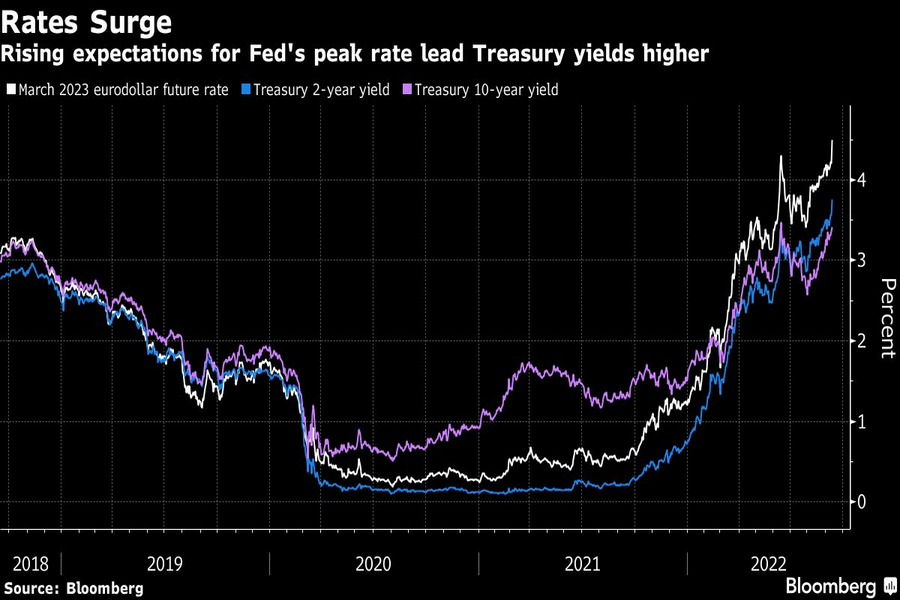

Ray Dalio came out with a gloomy prediction for stocks and the economy after a hotter-than-expected inflation print rattled financial markets around the globe this week.
“It looks like interest rates will have to rise a lot (toward the higher end of the 4.5% to 6% range),” the billionaire founder of Bridgewater Associates LP wrote in a LinkedIn article dated Tuesday. “This will bring private sector credit growth down, which will bring private sector spending and, hence, the economy down with it.”
A mere increase in rates to about 4.5% would lead to a nearly 20% plunge in equity prices, he added.
The rate market suggests traders have fully priced in a 75-basis-point hike next week by the Federal Reserve, with a slight chance for a full percentage point move. Traders expect the Fed fund rate to peak at about 4.4% next year, from the current range of 2.25% and 2.5%.
Dalio noted investors may still be too complacent about long-term inflation. While the bond market suggests traders are expecting an average annual inflation rate of 2.6% over the next decade, his “guesstimate” is that the increase will be around 4.5% to 5%. With economic shocks, it may be even “significantly higher,” he added.
Dalio said the U.S. yield curve will be “relatively flat” until there is an “unacceptable negative effect” on the economy.
A deepening inversion of key curve measures — seen by many as a potential harbinger of recession — has helped reinforce a more downbeat view about economic activity among investors.

Investors, speculating that the Fed will tip the economy into recession next year in the fight to curb inflation, already see policy makers easing rates in the later stages of 2023.
The S&P 500 is heading for its biggest annual loss since 2008, while Treasuries have suffered one of their worst beatings in decades.

The wealth tech platform says its newly secured patent represents crucial advances in digitizing outdated manual processes.

Financial advisors offer their thoughts on the President's widely anticipated executive order to open retirement accounts to private market assets.

The SEC says First Liberty lured investors with high-yield promissory notes, then used fresh cash to cover defaults and interest owed to earlier investors.

The agency's decision to stay the approval process just hours after signing off highlights ongoing ambiguity for new crypto-focused ETF offerings.

Meanwhile, Cetera has boosted its own recruitment numbers with new additions from LPL and Osaic.
Orion's Tom Wilson on delivering coordinated, high-touch service in a world where returns alone no longer set you apart.
Barely a decade old, registered index-linked annuities have quickly surged in popularity, thanks to their unique blend of protection and growth potential—an appealing option for investors looking to chart a steadier course through today's choppy market waters, says Myles Lambert, Brighthouse Financial.
